2012 An Interview with Wes Moore
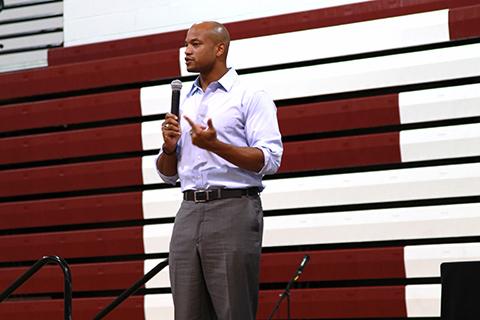
By JEN RETTER ’16
Photography CINDY GRAUL
Professors Bonnie Hayes and Bill Meiers chatted excitedly on the way to Philadelphia International Airport on Oct. 11. Their anticipation mounted as they awaited the arrival of the guest speaker who was expected to attract one of the largest crowds Arcadia’s Kuch Center Gym had ever seen.
The audience that evening would not be disappointed: Wes Moore, author of the New York Times bestselling novel The Other Wes Moore, proved to be exceptionally charismatic, articulate and, despite his extensive list of achievements, humble.
Prior to delivering his lecture, Moore opened up about events and decisions that led him to become a writer, Army combat veteran, Rhodes Scholar and youth advocate.
Jen Retter: The Other Wes Moore emphasizes the importance of decision making. What are some of the major decisions that you’ve made throughout your life that have impacted the person you are today?
Wes Moore: When I think about the most important decisions I’ve made in my life, they haven’t really stopped when I was a child. I’m very cognizant of the fact that I’m going to make 30 decisions before I go to sleep tonight, and that’s going to help to determine what my tomorrow looks like. It’s not something that ever ends. It’s something that we will deal with and have to continue processing until we’re no longer here. In many cases, some of the most important decisions that I’ve had in my life were decisions that I didn’t even make. They were decisions that were made for me, things that happened in my life that I had to react to. I can make a very good argument that the most important thing in my life was the fact that I was born to Joy Moore, and I had nothing to do with that. So much of the decision making process is about taking what’s in front of us, and doing something about it. How exactly do we react to circumstance? How exactly do we think about our lives in a different context?
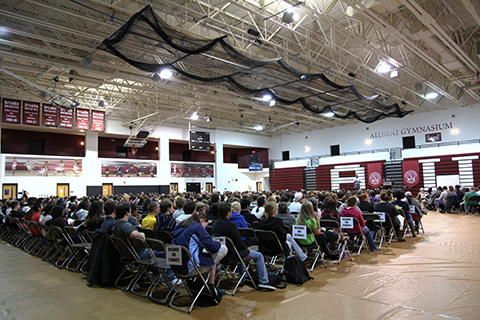
JR: Could you summarize some of the most important decisions that you discussed in The Other Wes Moore?
WM: In terms of the book, there’s one decision that I included that I thought was an important one. One thing that I tried to show in this book is that these are two kids who were actually very similar, and had very similar circumstances. That was intentional: I wanted to write the story that way. I wanted people to get just how thin that line really was. In the book, [I talk about] when I was at Valley Forge and [my friend and I were hit with a rock of some sort] while walking out into town. I remember at that moment in my life, I really had a decision to make. I could’ve stood there, and I could’ve waited, and, in a one-on-one situation, I could’ve taken care of myself. But the problem was, I had no idea if that’s what I was talking about. There could’ve been eight guys in that car, and they all could have had weapons. The best case scenario would have been that I’d knock every one of them out, and then I would’ve been arrested. That was the first time I really saw myself thinking about life in a different perspective and mindset. I didn’t care about consequences before. I was very angry, but I just realized that that was not the best way to live.
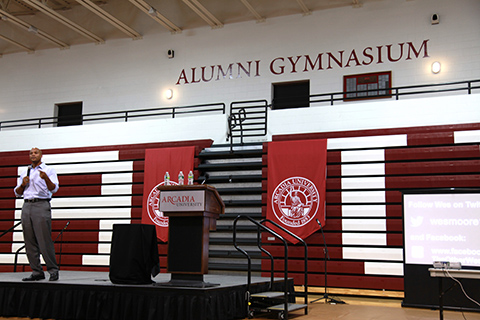
JR: A lot of your readers seem interested in learning more about your decision to contact the other Wes Moore. What was that experience like for you: learning that there was another Wes Moore, speaking to him through letters, and meeting face-to-face?
WM: Surreal. Initially, I had no idea why I reached out to him. There are still members of my family who are like, “We don’t know why you reached out to him.” I didn’t have a reason. I just learned more about him, thought it was interesting and wanted to ask him some questions. It was one of those decisions—I didn’t have to reach out to him, and we never would have connected. Also, Wes had no reason to reach back out to me. If Wes would have received my letter and said, “Whatever,” and moved on, then both of our lives would be very much different than what they are right now. One small decision took two lives on a completely different trajectory.
JR: Was your letter correspondence initially formal, or did you feel that immediate connection?
WM: In retrospect, it was probably more formal. I didn’t really know him. But we’ve known each other for close to a decade, so it’s definitely a very free conversation now.
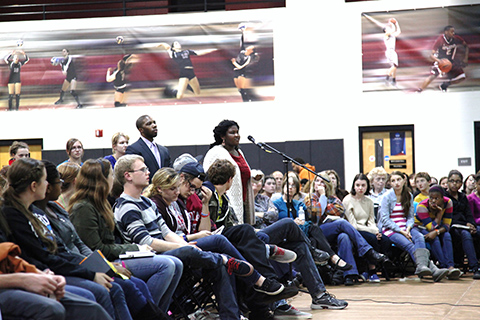
JR: For those who have not read The Other Wes Moore, and don’t know how personal and in depth the stories you and Wes shared were, could you describe what meeting him was like?
WM: It’s a long process. With it being a maximum security facility, it’s not easy. It took six to eight months just to get on the visitor’s list because they run a full background check on you. The first time I saw him was surreal because you’re never sure of what to expect. We were pen pals at that point. When you finally get the chance to sit with him, you realize how quickly you become comfortable. And then, when the guard taps you on the shoulder and says your time’s up, and [Wes] walks his direction and you walk your direction, it serves as a very jarring reminder of where you are.
JR: What message about decision making do you hope your audiences understand after reading The Other Wes Moore?
WM: When you juxtapose [my experience that night] with what happened to Wes, when he got picked up on attempted murder charges at 15 years old, [you see that] when life presents opportunities, challenges, whatever it is to us, how we react becomes important. Even for college students, sometimes it’s the smallest things that determine which way you go. Do you get in the car with the person who may have had one too many to drink? Do you go to class when you know if you miss one more, that you’re probably not going to do well?
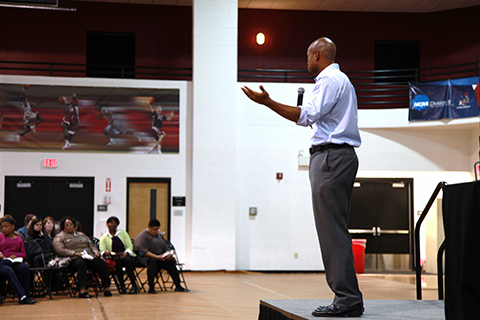
JR: Some of the decision that you personally made seemed to be influenced by your family members, who made many sacrifices to give you the opportunity to attend military school and receive the education you deserved. You made some sacrifices to repay them.
WM: I don’t think I could ever repay them, no matter what I do. [My mother] had all the reason in the world to give up multiple times, and she didn’t. She kept on fighting. I’ll never be able to repay her for that. One thing I do want to be clear about is that my mother didn’t love us a drop more than Wes’ mother loved her children. Wes’ mother, to this day, bleeds for her children.
JR: You exposed so much about your childhood and family life. What was the experience of writing about your family for the public to read like?
WM: It’s hard, Jen! If you take a military analogy, it’s very much like going out into combat without a flak vest. You went into this experience knowing that you were going to receive compliments that were utterly unjustified and potshots that were utterly unjustified. You have to be OK with both, and know that you can’t take either too seriously. I knew that the only way this story could be effective, though, was if I was willing to be transparent. Not just about Wes’ life, but about my own. So you have family members that sometimes weren’t happy about what you wrote about them, but that’s my memory. Writing isn’t easy, particularly when you’re writing nonfiction, and then particularly when you’re writing nonfiction about yourself and your family. It’s a whole other “not easy.”
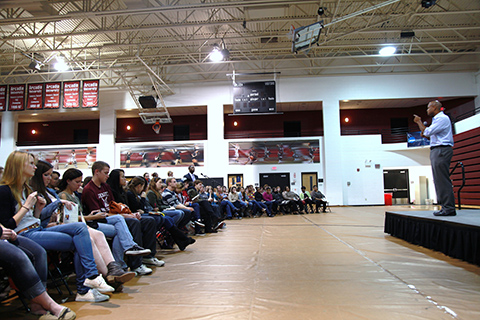
JR: In The Other Wes Moore, you talk about sacrifices that took place early on in your childhood. For instance, you describe giving up the comfort of living with your family and friends to attend military school. What are some of the other sacrifices that you feel have led you to where you are today?
WM: I guess I have a difficult time looking at them as sacrifices. Even going to military school wasn’t a choice, but staying there eventually was a choice. But I don’t know if I really consider them sacrifices, per se. Maybe, if I could separate myself from myself somehow, I could see it as that. Even as an adult, when I think about the things I’ve done, whether it be the service or the military, I don’t see them as sacrifices. I see them more as having an opportunity and following it. I know people who have made real sacrifices, and I’m very cautious about putting myself in that category.
JR: When I read the book, I was drawn to the idea that how we attempt to repay the people who have motivated us in our lives largely depends on the choices we make. You’re proof that pivotal decisions can lead to a successful future. I was wondering: What is your idea of success?
WM: I don’t think there’s a singular definition of success, because I don’t think there’s a singular definition of impact. That is the thing I think we all strive for: impact. We want to make ourselves relevant. As my colonel told me, “Make it matter that you were ever even here in the first place.” The thing that motivates me is purely legacy. To find something that I’m passionate about and say, “Before I am done, I will move the needle on (blank).” This issue will either be addressed, or closer to being addressed because I have spent my time fighting for it. If I’ve done that, then I can rest easy. Success for me is not a job title, a car or a house; a title’s not going to keep you warm at night, or help you think about what you’ve done with your life. There are a lot of people who have titles and do nothing with them. Legacy is the thing that really matters to me.
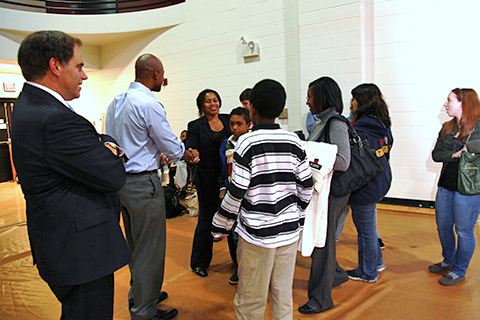
JR: Being on the road so often, you’ve definitely created a lasting legacy for yourself. What are some of the organizations that you participate in as a youth advocate?
WM: STAND [Students Taking A New Direction] works with kids involved in the criminal justice system, generally first- and second-time offenders. We work to mentor, befriend and tutor them to get them back on the right track. It’s been great, we’ve been running it for ten years now. We’ve got some pretty amazing kids and mentors. I feel like so many times we say “second chance” in a very glib fashion, and I think second chances should actually mean something. And I think we should help it mean something.
JR: You inspire many college students as well. What are some of the main messages of The Other Wes Moore that you hope come across when you speak to college audiences?
WM: I really try to adapt everything to the audience. I’m not the type of person that has a stump speech. You realize, particularly with college students, that we’re a pretty lucky bunch. There are a lot of folks out there who would love to be a college student. It is important to think back and genuflect on how many people out there really did sacrifice for us. If we come out of this process thinking we did it on our own, we’re living a dishonest life.
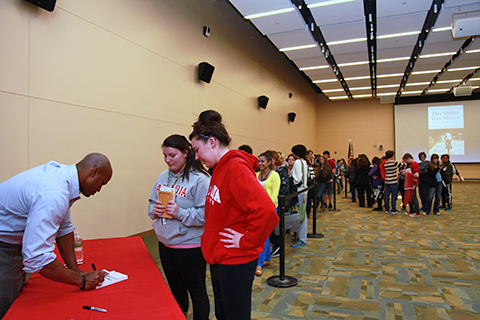
JR: How has the experience of talking about your story as a public figure affected you?
WM: I think one thing that I’ve really been touched by is how much this story has resonated with such a wide variety of folks, and in some ways that I wasn’t really expecting. We’re doing work right now with the mayor of Denver on gang prevention. We’re also doing work with a group of ministers in Mississippi. We’re doing work with two of the top private schools in New York City. There’s such a wide variety of people that have latched onto the story because I think that they get that every one of us has a Wes Moore in our life. Every one of us has a person that we went to school with or grew up with who’s doing something very different right now. For some people, it’s someone that lived in their home. That’s the issue that I wanted to explore with [The Other Wes Moore.] To say, “What are we going to do about it? What are we doing to make sure that avoidable tragedies don’t have to happen?” I’m firmly convinced that a lot of the tragedies that are happening in so many of our communities are avoidable. What happened to Wes was avoidable. The question is, are we going to step up and be engaged and involved? The coolest thing [about this experience] is being able to work with students, and the fact that colleges are now doing service projects in their community, all over the country, around this book.


